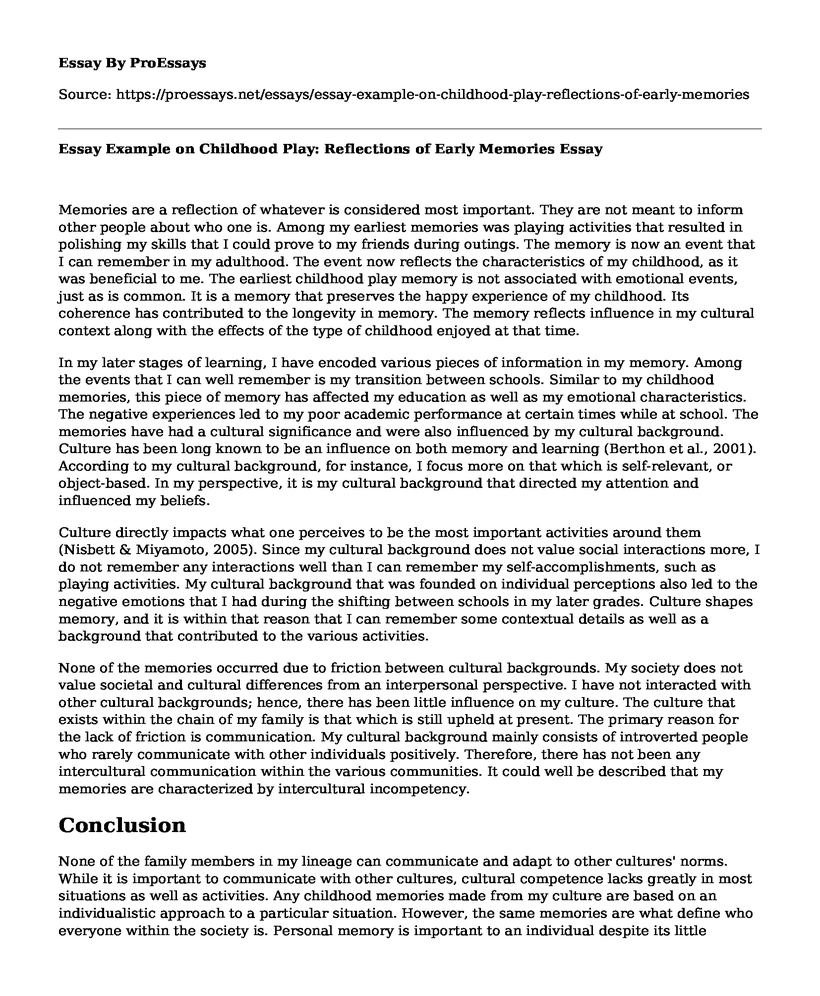Memories are a reflection of whatever is considered most important. They are not meant to inform other people about who one is. Among my earliest memories was playing activities that resulted in polishing my skills that I could prove to my friends during outings. The memory is now an event that I can remember in my adulthood. The event now reflects the characteristics of my childhood, as it was beneficial to me. The earliest childhood play memory is not associated with emotional events, just as is common. It is a memory that preserves the happy experience of my childhood. Its coherence has contributed to the longevity in memory. The memory reflects influence in my cultural context along with the effects of the type of childhood enjoyed at that time.
In my later stages of learning, I have encoded various pieces of information in my memory. Among the events that I can well remember is my transition between schools. Similar to my childhood memories, this piece of memory has affected my education as well as my emotional characteristics. The negative experiences led to my poor academic performance at certain times while at school. The memories have had a cultural significance and were also influenced by my cultural background. Culture has been long known to be an influence on both memory and learning (Berthon et al., 2001). According to my cultural background, for instance, I focus more on that which is self-relevant, or object-based. In my perspective, it is my cultural background that directed my attention and influenced my beliefs.
Culture directly impacts what one perceives to be the most important activities around them (Nisbett & Miyamoto, 2005). Since my cultural background does not value social interactions more, I do not remember any interactions well than I can remember my self-accomplishments, such as playing activities. My cultural background that was founded on individual perceptions also led to the negative emotions that I had during the shifting between schools in my later grades. Culture shapes memory, and it is within that reason that I can remember some contextual details as well as a background that contributed to the various activities.
None of the memories occurred due to friction between cultural backgrounds. My society does not value societal and cultural differences from an interpersonal perspective. I have not interacted with other cultural backgrounds; hence, there has been little influence on my culture. The culture that exists within the chain of my family is that which is still upheld at present. The primary reason for the lack of friction is communication. My cultural background mainly consists of introverted people who rarely communicate with other individuals positively. Therefore, there has not been any intercultural communication within the various communities. It could well be described that my memories are characterized by intercultural incompetency.
Conclusion
None of the family members in my lineage can communicate and adapt to other cultures' norms. While it is important to communicate with other cultures, cultural competence lacks greatly in most situations as well as activities. Any childhood memories made from my culture are based on an individualistic approach to a particular situation. However, the same memories are what define who everyone within the society is. Personal memory is important to an individual despite its little influence on culture (Rogoff & Mistry, 1985). It is easy to recognize cultural difference if one was to compare my culture with some others, including those that are close to ours. For as long as culture exists, my way of attending to certain stimuli to the environment, which in turn creates memories, can be adjusted seamlessly.
References
Berthon, P., Pitt, L. F., & Ewing, M. T. (2001). Corollaries of the collective: The influence of organizational culture and memory development on perceived decision-making context. Journal of the Academy of Marketing Science, 29(2), 135-150. https://doi.org/10.1177/03079459994515
Nisbett, R. E., & Miyamoto, Y. (2005). The influence of culture: Holistic versus analytic perception. Trends in Cognitive Sciences, 9(10), 467-473. https://doi.org/10.1016/j.tics.2005.08.004
Rogoff, B., & Mistry, J. (1985). Memory development in a cultural context. Springer Series in Cognitive Development, 117-142. https://doi.org/10.1007/978-1-4613-9544-7_4
Cite this page
Essay Example on Childhood Play: Reflections of Early Memories. (2023, Jul 02). Retrieved from https://proessays.net/essays/essay-example-on-childhood-play-reflections-of-early-memories
If you are the original author of this essay and no longer wish to have it published on the ProEssays website, please click below to request its removal:
- Personal Essays
- Susan's Issues in Class Case Study
- Paper Example on My Teaching Philosophy: Progressivism for Successful Learning
- Four-Day School Weeks: Pros and Cons - Essay Sample
- Five Stages of Literacy Development: Initial Stage - Essay Sample
- Essay on AARC Raises Respiratory Therapist Educational Requirements to Bachelor's Degree
- Essay Example Congenital Muscular Dystrophy: A Rare, Heterogeneous Neuromuscular Disorder







